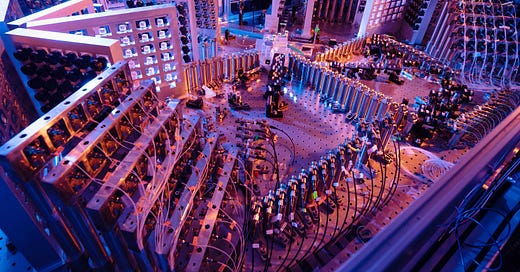.
.
Chinese researchers have made an astonishing, groundbreaking achievement in quantum computing with the unveiling of Zuchongzhi 3.0, a quantum processor that boasts an astonishing speed of one quadrillion times faster than the world's best supercomputers. This remarkable leap forward is attributed to the processor's 105 superconducting qubits, which enable it to complete calculations in mere seconds that would take traditional machines billions of years to accomplish.
To put this into perspective, the researchers conducted an 83-qubit, 32-layer random circuit sampling task on the system, which was completed in just a few hundred seconds. In contrast, the world's most powerful supercomputer, Frontier, would take approximately 5.9 billion years to complete the same task.
Zuchongzhi 3.0's impressive performance is also evident in its comparison to Google's latest Willow QPU. The Chinese processor outperforms Google's results by six orders of magnitude, establishing a new benchmark in quantum computational advantage.
The significance of this breakthrough extends beyond the realm of quantum computing, as it has the potential to tackle complex real-world challenges. The researchers are actively exploring applications in quantum error correction, quantum entanglement, quantum simulation, and quantum chemistry.
*Key Features of Zuchongzhi 3.0:*
- *105 superconducting qubits*: Enables fast and efficient processing of complex calculations.
- *72 μs coherence time*: Allows for more complex operations and computations
- *99.90% parallel single-qubit gate fidelity*: Ensures high accuracy in quantum computations
- *99.62% parallel two-qubit gate fidelity*: Enables reliable performance of quantum algorithms
Quantum Supremacy and Benchmarking:
China's quantum computers, like Zuchongzhi 3.0, are demonstrating quantum supremacy by completing tasks faster than the most powerful classical supercomputers.
The Zuchongzhi 3.0 processor demonstrated its superiority in random quantum circuit sampling tasks.
The random circuit sampling benchmark used by researchers favors quantum methods, but improvements in classical algorithms may close the gap.






Just think of a quantum computer with a 1,000 qubits, and what it could accomplish.
It will come eventually..
It's hard to believe the speed of this achievement